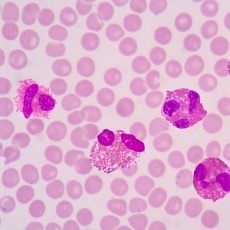
Eosinophilia

Summary
Eosinophils are a type of white blood cell. They help fight off infections and play a role in your body’s immune response. They can also build up and cause inflammation.
Normally your blood doesn’t have a large number of eosinophils. Your body may produce more of them in response to:
- Allergic disorders
- Skin conditions
- Parasitic and fungal infections
- Autoimmune diseases
- Some cancers
- Bone marrow disorders
In some conditions, the eosinophils can move outside the bloodstream and build up in organs and tissues. This can happen in many different parts of the body, including the esophagus, heart, lungs, blood, and intestines. Treatment of eosinophilic disorders can vary, depending on the cause and which part of the body is affected. Steroids are often part of the treatment.
Source: MedlinePlus, National Library of Medicine.
Information pulled from the Eosinophilic Disorders page.
MedlinePlus brings together authoritative health information from the National Library of Medicine (NLM), the National Institutes of Health (NIH), and other government agencies and health-related organizations.
Eosinophilia
Mayo Foundation for Medical Education and Research
Eosinophilic Disorders
Merck & Co., Inc.
Upper GI Endoscopy
National Institute of Diabetes and Digestive and Kidney Diseases
Listen to our
latest Podcast!


